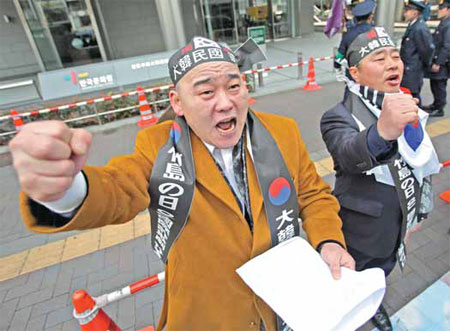Japanese demonstration aggravates South Korea
|
South Korean demonstrators stage a counterprotest at the Japanese embassy in Seoul. Both countries claim a set of disputed islands, called Dokdo in South Korea and Takeshima in Japan. Issei Kato / Reuters |
500 attend event to show support for Tokyo's claim to disputed islands
Ties between Japan and South Korea were further strained on Friday as an annual rally was held in Japan in support of Tokyo's claim to a set of disputed islands.
About 500 people, including local and national politicians, attended the event in Shimane prefecture in western Japan.
Seoul was particularly incensed by the presence at the rally of Aiko Shimajiri, a parliamentary secretary in Tokyo's Cabinet Office and the highest-ranking Japanese government official ever to attend the event.
Though lawmakers have attended in the past, Japan had never sent a senior official to the annual event, Japan's Kyodo News Agency said.
Seoul calls the islands between the two countries Dokdo, and Tokyo refers to them as Takeshima.
South Korea reacted angrily to the event. Hundreds of activists shouting anti-Japanese slogans demonstrated outside the Japanese embassy in Seoul.
The South Korean government again sternly urged Japan to abolish ordinances about the designation of the islands and to "immediately stop unjustifiable territorial claims" to the islands, South Korean Foreign Ministry spokesman Cho Tai-young said in a statement.
The South Korean government also criticized Japan for sending Shimajiri to the event, Seoul-based Yonhap News Agency said.
Later in the day, Park Jun-yong, director-general of Northeast Asian affairs at the foreign ministry, summoned Takashi Kurai, deputy chief of mission at Japan's embassy in Seoul, to the ministry and lodged an official protest against the event, Kyodo reported.
Japanese Chief Cabinet Secretary Yoshihide Suga, Tokyo's top spokesman, on Friday said Shimajiri, the parliamentary official, had been sent to the ceremony "as a matter of course", and Suga claimed that the islands are "an integral part" of the country.
Kyodo News Agency quoted Shimajiri as saying during the ceremony that "it goes without saying" that the islands are Japanese territory.
Relations between the two countries have regularly been strained by the territorial dispute and other issues that have arisen from Japan's 1910-45 colonial rule over the Korean Peninsula.
The territorial dispute worsened last year after South Korean President Lee Myung-bak visited the islands on Aug 10.
Beijing has always maintained that both sides should resolve such disputes through dialogue and reconciliation, Chinese Foreign Ministry spokesman Hong Lei told reporters at a daily news conference on Friday in response to a question about the issue.
Japan's conservative Prime Minister Shinzo Abe, who swept national elections in December and reclaimed his country's leadership, sent a message to South Korean president-elect Park Geun-hye last month seeking a new start to a relationship dogged by bitter historical disputes.
During his previous term as prime minister, Abe angered South Koreans by denying the Japanese military's direct involvement in forcing women into sexual slavery during World War II, AFP said.
The South Korean Foreign Ministry on Thursday had warned, without elaborating, that Seoul would "take appropriate measures" if Japan pushed ahead with the Friday rally.
The event is "expected to affect relations" between Tokyo and Seoul at a time when the two countries are fostering ties between their new leaderships, Kyodo said. Park will assume the South Korean presidency on Monday.
Tokyo on Wednesday confirmed that Taro Aso, deputy prime minister and finance minister, will attend the inauguration ceremony.
Tokyo is also embroiled in separate territorial rows with Beijing and Moscow.
Suga, the Japanese chief Cabinet secretary, also said on Friday that Aso's participation in the ceremony can be considered as the Japanese government's effort to mend relations with South Korea, and Aso maintains close ties and trust with South Korea.
AFP-China Daily
(China Daily 02/23/2013 page8)









